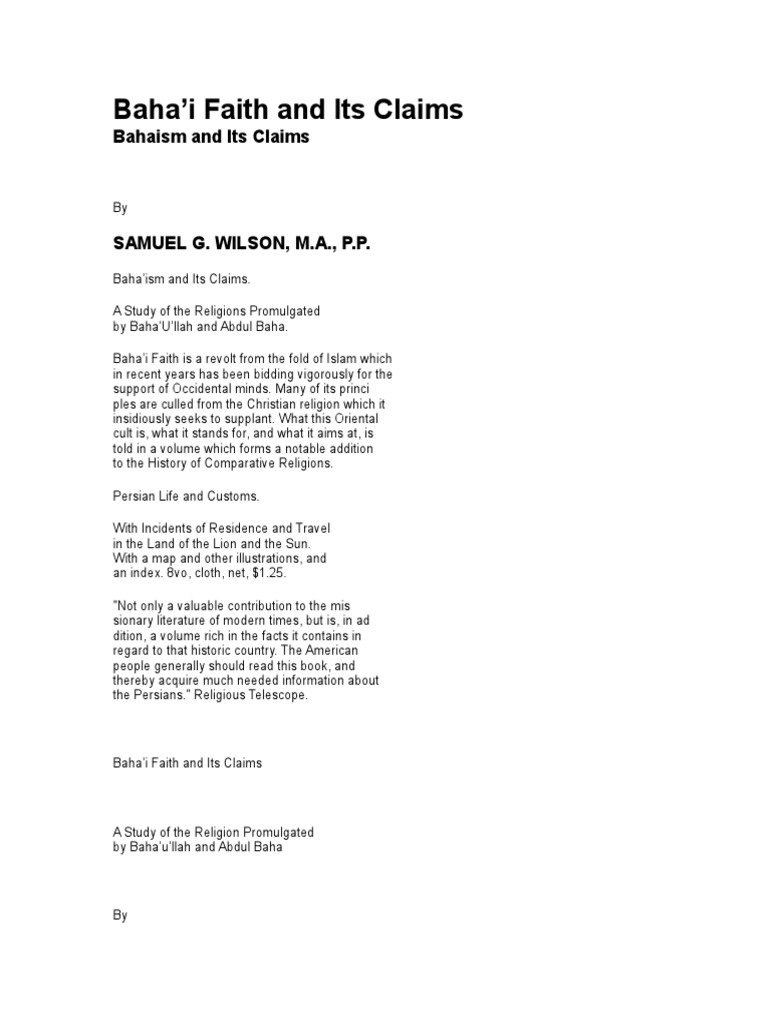The Baha’i Faith, a religion founded in the mid-19th century, often attracts scrutiny and critique for various reasons. Understanding these critiques is crucial in fostering a nuanced perspective on the Baha’i teachings and their implications. This analysis elucidates some common points of contention that critics leverage against the Baha’i Faith while simultaneously offering insights that may challenge preconceived notions.
1. The Proclamation of a New Prophet
One of the most prevalent criticisms stems from the Baha’i belief in the legitimacy of Baha’u’llah as a prophet, alongside previous figures such as Jesus, Muhammad, and Moses. Critics often argue that the faith’s assertion undermines the sanctity of established religions. They question how a new prophet could arise in a contemporary context, positing that prophetic authority belongs exclusively to antiquity. However, Baha’is embrace a dynamic understanding of divine revelation, which posits that truth is progressively revealed and that further guidance is necessary as humanity evolves. This perspective invites exploration into the continuous nature of spiritual development, suggesting that truth can be both timeless and progressive.
2. The Concept of Universalism
Universalism, a core tenet of Baha’i teachings, advocates for the unity of all religions and peoples. Critics often invoke the sentiment that this amalgamation dilutes the distinctive doctrines of individual faiths. Detractors argue that blending various spiritual traditions into a singular worldview trivializes the historical significance and authenticity of each tradition. However, this critique begs a deeper inquiry into the interconnectivity of human experiences and beliefs. Baha’is argue that while diverse, the underlying principles of love, justice, and compassion transcend cultural boundaries, thus enriching rather than diminishing the spiritual landscape. Such a viewpoint offers an opportunity to reframe conversations about interfaith dialogue and mutual respect.
3. Gender Equality and Women’s Rights
The Baha’i Faith ardently advocates for gender equality, often positioning itself against traditional gender roles. Critics may assert that this advocacy is overly ambitious or unrealistic, particularly in regions where gender disparities are deeply entrenched. Skepticism may arise regarding the practical implications of Baha’i teachings on gender, with opponents questioning their feasibility in culturally conservative societies. Nevertheless, an examination of Baha’i principles reveals a transformative approach where gender equality is not merely desirable but essential for societal advancement. By confronting systemic inequities and promoting shared responsibilities, the Baha’i teachings challenge us to consider the broader implications of justice and equality in every facet of life.
4. The Abolishment of Prejudice
Baha’i teachings unequivocally denounce all forms of prejudice, be it racial, religious, or class-based. This stance often meets resistance, particularly in multicultural environments where entrenched biases exist. Critics may contend that advocating for the eradication of prejudice oversimplifies complex sociopolitical issues. They may argue that while the principle is laudable, it overlooks the nuance of historical grievances. However, such critiques can lead to an illuminating discourse on the mechanisms of bias and the importance of conscious recognition and action. The Baha’i principle encourages individuals to recognize their prejudices and actively work towards mutual understanding and respect, thereby promising a profound shift in societal interactions.
5. The Role of Authority
In the Baha’i framework, a unique system of governance exists, delineated by the Universal House of Justice, which is perceived as divinely inspired. Critics often voice concern regarding this institutional authority, suggesting it may lead to an erosion of individual autonomy or discourage intellectual freedom. Skeptics may fear the potential categorization of dissenting views as heretical. However, this perspective overlooks the Baha’i emphasis on consulting as a method for decision-making, which encourages participation and diverse viewpoints. Such a structure invites a reflective examination of authority and governance, urging individuals to consider how communal decision-making can coexist with personal belief and inquiry.
6. The Emphasis on Global Solutions
Baha’i teachings advocate for collective action in addressing global issues such as poverty, climate change, and war. Critics might argue that the faith’s emphasis on global solutions is idealistic and fails to account for local contexts and needs. Moreover, they may view this universal approach as neglectful of the intricacies involved in community-specific challenges. However, this critique prompts a necessary exploration of the balance between global and local action. The Baha’is posit that while localized initiatives are vital, a coordinated global response, underpinned by unity, is essential for sustainable progress. This proposition invites contemplation on how local actions can align harmoniously with global imperatives.
7. The Importance of Education
The Baha’i teachings underscore the pivotal role of education in the development of individuals and communities. Critics may claim that this focus neglects practical skills in favor of a more abstract understanding of knowledge. They might argue that such an emphasis could lead to an elitist ethos. Yet, this view misses the broader objective of education in the Baha’i Faith, which advocates for the cultivation of moral and spiritual values alongside intellectual development. Acknowledging the importance of comprehensive education can provoke thought on not only what knowledge is pursued but how it impacts societal advancement.
In sum, while critiques of the Baha’i Faith highlight pertinent concerns, they also serve as a catalyst for deeper inquiry and dialogue. By examining these points of contention, individuals can not only reassess the Baha’i teachings but also engage in a broader conversation about spirituality, human rights, and global unity. As society grapples with life’s complexities, the teachings of the Baha’i Faith offer a perspective that encourages curiosity and challenges conventional paradigms, fostering a more inclusive and interconnected world.
